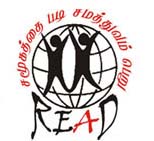Cause Area
Primary Sectors
Secondary Sectors
Geographies Served
Programs
-
Responding the Textile Workers to Overcome the Impacts of COVID Lockdown
District
Erode
Tiruppur
States
Tamil Nadu
READ focuses on empowering the textile workers community to address human rights violations, particularly labor rights infringements exacerbated by the COVID-19 pandemic. With the textile industry severely impacted by economic downturns and vulnerable to abuses like forced labor, child labor, and low wages, READ conducts on-field initiatives to support workers. These include awareness campaigns on women's protection systems, ethical recruitment training for mill managements, and addressing grievances through public forums and legal clinics. Additionally, READ provides training on relevant laws and procedures to empower workers and engage with government authorities and local leaders to advocate for workers' rights in Erode and Tirupur.
-
Erode Railway Child Help Desk Rescues Children at Railway Junction
StateStates
Tamil Nadu
In a collaborative effort between the Ministry of Women and Child Development and the Ministry of Railways, an initiative has been launched to safeguard the well-being of run-away, unaccompanied, and trafficked children encountered within the railway system. Through collaboration with CHILDLINE India Foundation (CIF), READ, alongside CIF volunteers stationed at the Erode Railway Station, plays a vital role in identifying vulnerable children and providing them with necessary support. This includes protection from exploitative situations, facilitation of legal processes before the Child Welfare Committee, and assistance in connecting them with rehabilitative services for their long-term well-being. These services are extended to children who come into direct contact with the railways, either through reported cases to CHILDLINE 1098 or referrals by concerned individuals.
-
Well-Being and Development of Interstate Migrants
StateStates
Tamil Nadu
In Tamil Nadu, the textile industry stands as one of the largest labor-intensive sectors after agriculture, with numerous small and medium manufacturing units spread across 18 districts. A significant portion of the workforce comprises migrant workers from states like Bihar, Orissa, Jharkhand, Assam, and others, constituting 15% to 35% of the total textile labor force. Unfortunately, practices such as the Sumangali Scheme, akin to forced labor, persist, particularly affecting young female workers who endure long hours, inadequate wages, and substandard working conditions. READ's initiatives encompass various aspects, including interstate migration registration, children's education for migrant families, grievance resolution, training, counseling, medical camps, research, and collaboration with textile industries and brands. Recently, READ has established educational centers in migrant settlements to prevent school dropouts and launched a Migrant Registration App and Helpline Number (73
-
Building Resilience through Psychosocial Care and Life Skill Education
StateStates
Tamil Nadu
The organization addresses the challenges faced by children living in adverse conditions within their families, society, and schools, which can hinder their socialization and lead to exclusion. Through structured psychosocial interventions, they aim to facilitate the social development of these children and reinforce protective factors. With support from NIMHANS, the organization has implemented robust psychosocial care programs across all activity centers. Trained staff utilize child-friendly methods such as thematic story cards, play, and drawing to help children express their emotions and cope with past traumatic experiences. Additionally, life skills training is provided to enhance children's ability to manage relationships, stress, and emotions, fostering critical and creative thinking, problem-solving, and decision-making skills. These interventions have proven to be transformative, empowering many children to overcome emotional distress and regain normalcy in their lives.
Leadership Team
-
Karuppusamy
Secretary
-
Bannan
Executive Member
-
Gurusamy
Treasurer
-
K Palanisamy
President
-
Devaneyan
Vice President
-
Krishnaveni P
Joint Secretary
Demographics & Structure
-
Organisation Strength
None
Registration Details
-
PAN Card
AAAAR4719G
-
Registration Number
62/2001
-
CSR Form 1
Not Available
-
80G
AAAAR4719GF20221
-
12A
AAAAR4719GE20161
-
FCRA
76060067
About
-
Headquarters
Erode, Tamil Nadu
-
Since
2001
Impact
READ has conducted programs creating impact in different areas including education, workers rights, combating human trafficking, and community development.
Vision and Mission
READ's vision is to bring sustainable changes among the most marginalized communities in Erode District, Tamil Nadu, South India. Their mission is to address socioeconomic and cultural challenges of children, youth, and women of the most marginalized communities.
Political & Religious Declarations
-
Political Affiliation
-
Religious Affiliation
Location
-
Headquarters
No. 195, MGR Nagar, Kombupallam Bannari Amman Main Road, Erode - 638401, Tamil Nadu, India
Directions, Erode, Tamil Nadu -
Offices in Cities
Other Details
-
Type
Non-profit
-
Sub Type
Society
Website
Technology Adoption
-
SOC 2 Compliant
No
-
Financial Management
-
Beneficiary Management



